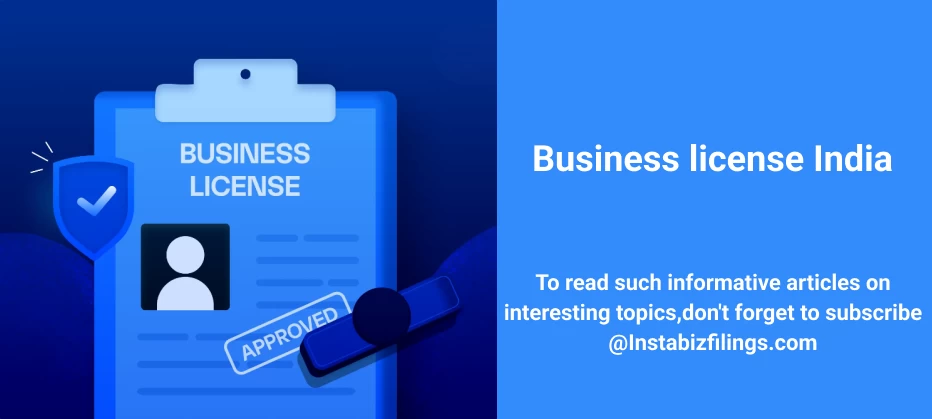
Business license India
July 9, 2025 by Team Instabizfilings
Introduction
In India, having a great idea and sufficient capital is not enough to start a business you also need to meet several legal requirements. One of the most important among them is obtaining the necessary business licenses. Whether you're launching a startup, opening a shop, or offering services, having the right licenses ensures your operations are both legal and trustworthy.
This guide will tell you all that you need to know about the business license in India, its type, the process of obtaining it, the documents to be filed and its cost.
What is a Business License?
A business license refers to a formal document given in the form of an authorisation by a government that enables the person or firm to deal in business within the stipulation of a locality, state or a central authority. It will also ensure the business is within the industry laws and regulations.
Why do we need a business license in India?
-
Legal Compliance: It is illegal to work without a license, and this may result in fines or closure.
-
Consumer Trust: The aspects of being legitimate and credible are viewed as an established business.
-
Access to Loans & Tenders: Most lending institutions demand the required licenses to grant loans.
-
Tax Registrations: GST registration, as an example, may require simple business documentation and licenses.
Types of Business Licenses in India
Depending on your business line and premises, you can be required to obtain one or several of the following licenses:
-
Shops and Establishment License: This is needed in case of any commercial establishments, such as offices and physical shops.
Issued by: Local Municipal Corporation. -
Trade License: Required to conduct certain trading activities such as any manufacturing, food service, etc.
Issued by: Local Authority (Municipality or Panchayat). -
FSSAI License (Food License): It is required in businesses that produce or sell foods.
Issued by: Food Safety and Standards Authority of India. -
GST Registration: More than 20 lakh rupees in a year in states such as GST Registration
Issued by: Central Board of Indirect Taxes and Customs (CBIC). -
Professional Tax Registration: In some states, you would be expected to pay professional tax if you have employees.
Issued by: State Government. -
Import Export Code (IEC): Needed by companies that deal with imports or exports.
Issued by: Director General of Foreign Trade (DGFT). -
Udyam Registration (MSME): To take the benefits of the government in the case of small and medium enterprises.
Issued by: Ministry of Micro, Small and Medium Enterprises.
Documents Required
Some of the documents that will be needed, depending on the license needed, are:
-
The business owner's PAN Card
-
Identification Documents such as an Aadhar Card or any other document of identity
-
Letter of address (place of business)
-
Evidence of business registration (e.g. partnership deed, incorporation certificate)
-
Bank information
-
Passport-sized photographs
-
NOC by landlord (in the case of leased premises)
How to Apply for a Business License in India
-
Determine the Type of License: In which license(s) does your business need to run on?
-
Collect Required Documents: Prepare digital and physical copies.
-
Online/Offline submission of Application:
- In the cases of local licenses (such as Trade or Shop License) check your municipal site.
- In case of GST, FSSAI, and IEC, the same could be applied on respective government portals.
-
Pay the Fees: There are a variety of fees that are dependent on type, state and duration.
-
Inspection (if required): There may be licenses that need physical verification.
-
Receive the License: Verified, the license is given either funded or printed.
Cost of Business Licenses in India
License fees vary based on location and business type:
|
License Type |
Cost Range (INR) |
|
Shop & Establishment |
₹500 – ₹3,000/year |
|
Trade License |
₹2,000 – ₹10,000 |
|
FSSAI License |
₹100 – ₹7,500 |
|
GST Registration |
Free (if self-applied) |
|
IEC Code |
₹500 |
|
Free |
Note: There could be different charges which will depend on the state and the size of the business.
Penalties for Not Having a Business License
Carrying on businesses without any valid business permit can cause:
-
Hefty fines
-
Business closure
-
Legal action
-
Distrust among consumers
Disclaimer
The information provided in this blog is purely for general informational purposes only. While every effort has been made to ensure the accuracy, reliability and completeness of the content presented, we make no representations or warranties of any kind, express or implied, for the same.
We expressly disclaim any and all liability for any loss, damage or injury arising from or in connection with the use of or reliance on this information. This includes, but is not limited to, any direct, indirect, incidental, consequential or punitive damage.
Further, we reserve the right to make changes to the content at any time without prior notice. For specific advice tailored to your situation, we request you to get in touch with us.

Need more details? We can help! Talk to our experts now!
Start Your Business Registration – Talk to Our Experts Now!

Still Confused?
Talk to experts? Fill in the information and we will reach out in 24 Working Hours.

